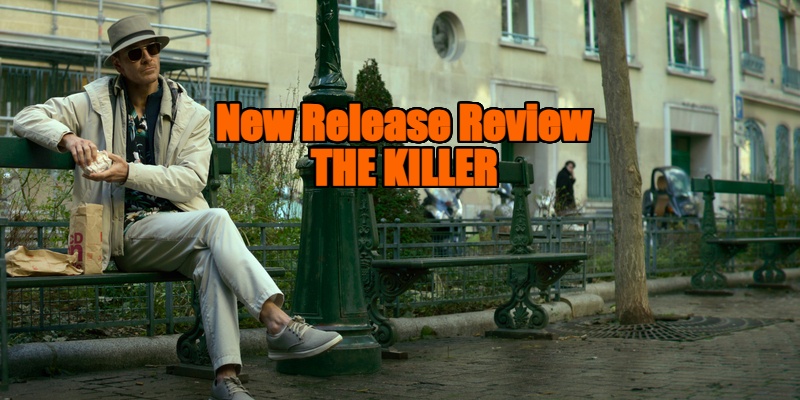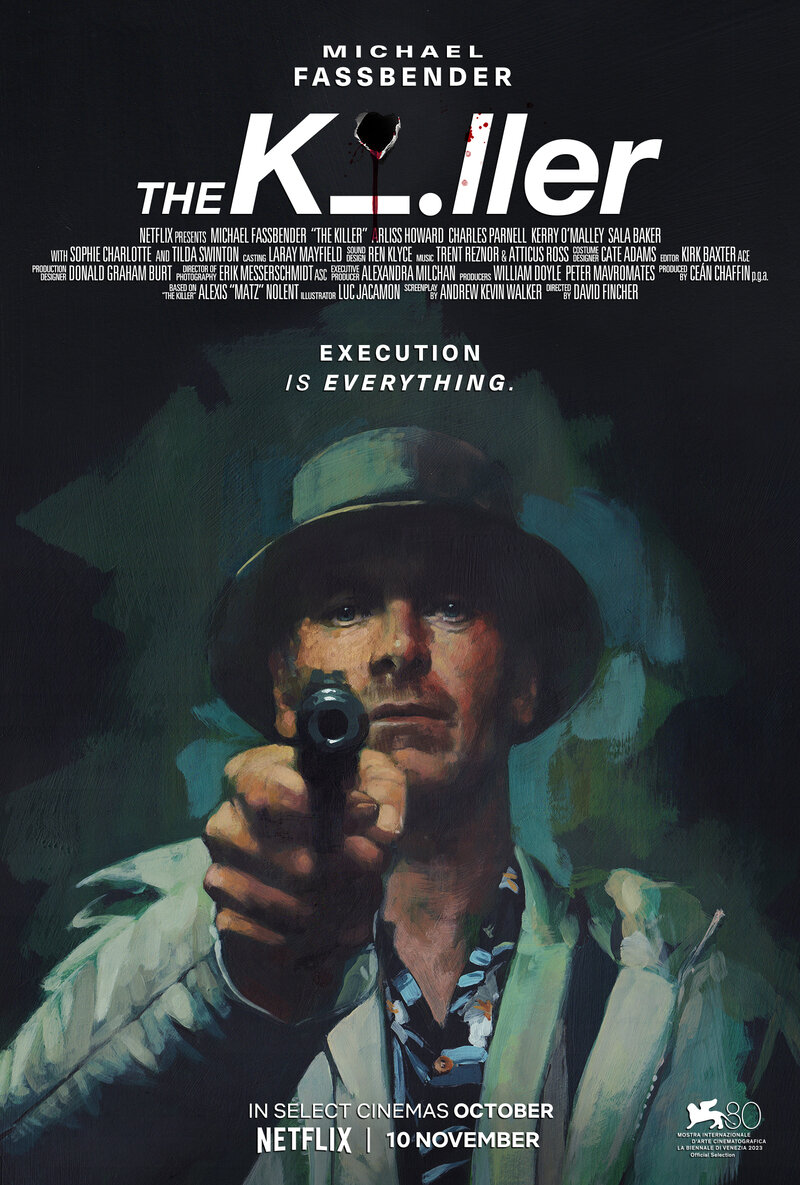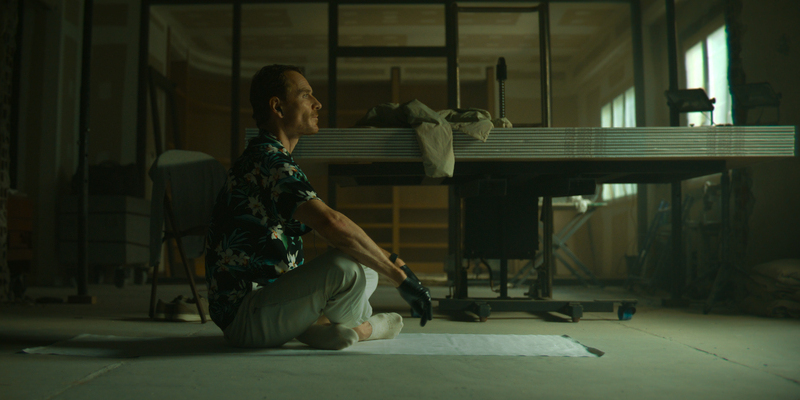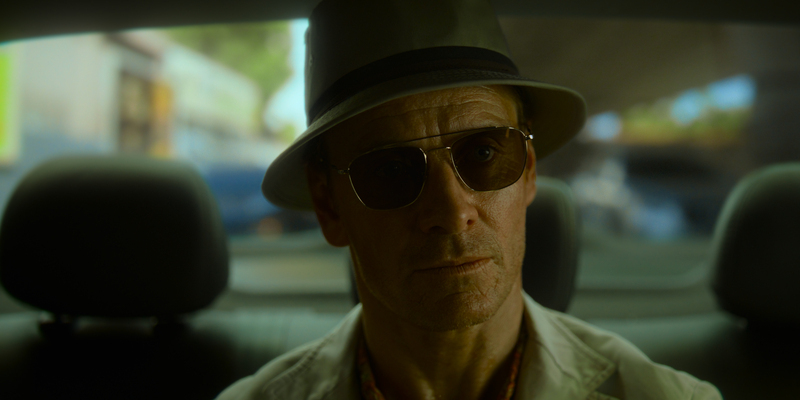
Review by
Eric Hillis
Directed by: David Fincher
Starring: Michael Fassbender, Tilda Swinton, Arliss Howard, Charles Parnell, Kerry O'Malley, Sala Baker, Sophie
Charlotte

From Vince Edwards in Murder by Contract to Forest Whitaker
in
Ghost Dog, there's a long tradition of cinematic hitmen becoming unravelled by the
unexpected appearance of a woman in their sights. With
The Killer, David Fincher simultaneously embraces and perverts this trope.
Things come undone for the film's unnamed assassin (Michael Fassbender) when a dominatrix appears in the hotel room of the man he's been hired to
shoot from a building across the street. Accidentally shooting the sex
worker rather than his intended target, the titular killer finds himself
targeted by his employers, as movie assassins so often are.
Scripted by Se7en's Andrew Kevin Walker, The Killer features a Patrick
Bateman-esque voiceover in which the killer lays out his cold blooded
philosophy, a hodge podge of Aleister Crowley quotes and personal mottos
like "Forbid empathy" and "Stick to the plan." He justifies his actions by
outlining the global ratio of births to deaths, claiming nothing he does
will make any substantial difference to the world. He's quickly proven an
unreliable narrator. For a start, it turns out he's far from the loner his
initial ramblings might fool us into believing he is. He has a girlfriend in
the Dominican Republic, and when she's hospitalised following a botched
attack by his employers, the killer goes after the men and women
responsible.

The killer prides himself on the cold detachment that allows him to do his
job, but this time it's personal. His actions betray his thoughts. His
voiceover tells us he's in control of a situation only for it to go tits up,
his narration literally interrupted at several points by unforeseen
obstacles. He displays empathy by refusing to shoot a guard dog, instead
taking a risk by trying to immobilise the animal with sleeping tablets.
Hitmen caring more for nature than humanity is a trope we've seen in the
like of Le Samourai, Ghost Dog and Leon.
But as the title suggests, the killer is after all, a killer. This isn't a
redemption story of a sociopath seeing the error of their ways. The killer
is too far gone at the point we meet him for that to be an option. He has no
problem killing relatively innocent people if they get in his way. Fincher
isn't asking us to empathise with his protagonist. Instead, the director
appears to be using the killer as a metaphor for himself. You may not like
what I do, he seems to be implying, but maybe I can make you appreciate my
dedication to what I do.

Like so many of the best filmmakers, Fincher has often found himself
accused of being "cold." This is an accusation that tends to be levelled at
filmmakers who believe in visual storytelling and refuse to condescend to
their audience. Fincher's worst film is
Mank, which spells out everything for the audience. His best is
Zodiac, which is ultimately an unsolved puzzle. You can't imagine Fincher giving
anyone a Christmas present because despite his obsession with precision, he
doesn't know how to neatly tie a bow. His best films feature professionals
who find themselves frustrated by the messiness and unpredictability of the
world. You can imagine he sends a lot of food back.
Like Paul Schrader's recent films, The Killer suggests an
aging filmmaker making peace with a world he finds increasingly frustrating and in which he feels increasingly irrelevant.
15 years ago Zodiac played on the biggest screens in your
city. Today it would be a Netflix original, if made at all. Fassbender's
killer's work is complicated by the modern world with its ubiquitous
surveillance, but he also embraces its quirks. He orders the tools of his
trade via rapid Amazon delivery. He can slip through crowds because
everyone's too busy staring at their cellphones. He gains access to
otherwise secure points by posing as delivery men. He rents a WeWork space
to use as a vantage point. In what feels like Fincher and Walker frowning at
modern audience's disinterest in any media made before the 21st century, he
uses a string of aliases based on '70s and '80s sitcom characters because he
probably figures they won't be recognised by any of the millennials and
Gen-Zers he now has to contend with in his daily life. As the film
progresses, the killer's solipsistic narration crumbles as he accepts that
for all his Nietzschean philosophy, he's just another working stiff. Is this
how filmmakers now feel when they work with (or for?) streaming services,
that they might have once been considered auteurs but are now just "content
creators?" The idea is bleaker than anything portrayed in
The Killer.

Despite that bleakness, The Killer is a surprisingly humorous
movie from a director not exactly known for making laugh riots. There's a
lot of physical comedy generated by Fassbender, who plays the role like a
man who believes he's Sean Connery but is actually Roger Moore, losing his
cool exterior and bumbling around when he actually has to fight someone. In
what feels like a nod to Jim Jarmusch's other hitman movie,
The Limits of Control, a peroxide Tilda Swinton pops up in a very amusing cameo. There
are some zingers in the voiceover, like the killer's reveal that he dresses
like a German tourist when in Paris because he knows Parisians will avoid
him that way.
As amusing as the voiceover is, I can't help but wish Fincher had the balls
to drop it, though that's probably not a decision that was ultimately his to
make. Remove the voiceover and The Killer almost becomes a
silent movie, and would no doubt become a lot more immersive as a result.
It's fun to see the killer contradict his own thoughts, but it could be more
satisfying for the audience to try to figure out what he might be thinking.
It would also allow us to focus solely on the process, that of the filmmaker
and his protagonist/cypher. That said, I understand what Fincher and Walker
are doing with their voiceover. They know that a significant portion of
their audience won't actually watch their film, they'll listen to it while
folding laundry or ironing shirts or doing homework. The joke will be on
them.


